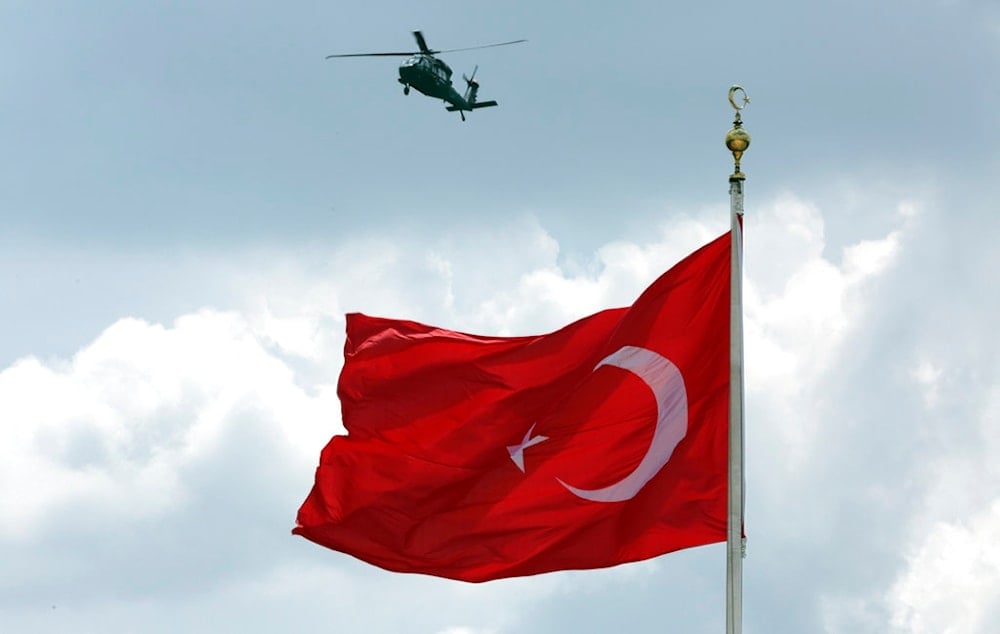Erdogan, Trump discuss Gaza war, defense ties amid policy rift
Erdogan's call with Trump focused on reviving defense cooperation and addressing the war on Gaza.
-

A military helicopter flies over as Turkey's President Recep Tayyip Erdogan visits the mausoleum of Mustafa Kemal Ataturk, founder of modern Turkey, in Ankara, Turkey, Thursday, Aug. 2, 2018 (AP)
The Turkish presidency on Friday announced that President Recep Tayyip Erdogan held a phone conversation with US President Donald Trump to discuss bilateral relations and the situation in Gaza, a war that has sharply exposed policy rifts between Ankara and Washington, even as the two NATO allies seek to rebuild ties through defense and diplomacy.
"Turkish President Recep Tayyip Erdogan held a telephone conversation with US President Donald Trump today at the latter's request. During the conversation, bilateral relations between Turkey and the United States, as well as the situation in Gaza, were discussed," the presidency said in a statement.
Erdogan noted that his September 25 visit to Washington had helped revitalize relations after years of tension and called for expanded collaboration across key sectors, particularly defense. "It was important to take steps to strengthen cooperation between the two countries in all areas, primarily in the defense industry," he said.
Uneasy Alliance
During that visit, the two leaders discussed Turkey's reinstatement into the F-35 fighter jet program and upgrades to its F-16 fleet, long-standing points of contention following Ankara's purchase of Russia's S-400 air defense system. Trump reportedly signaled an openness to revisiting the issue, hinting at a possible easing of restrictions on joint defense production and technology transfers. The talks were widely seen as part of a broader reset between the two countries, which have clashed in recent years over Syria, energy policy, and NATO strategy.
But while the meeting underscored strategic convergence on defense, deep divisions remain over the Gaza war and US mediation efforts. Erdogan, who has accused "Israel" of committing genocide against Palestinians, has positioned Turkey as a leading voice in calls for accountability and an immediate ceasefire. Ankara has suspended trade with "Israel" and intensified diplomacy with regional actors, including Qatar, Egypt, and Saudi Arabia, to push for a negotiated truce.
Contested Peace
The Trump administration, meanwhile, has rolled out a 20-point Gaza peace plan that includes provisions for a ceasefire, phased Israeli withdrawal, and, controversially, the disarmament of Hamas and other Palestinian resistance factions. While Trump has framed the proposal as a pathway to stability, critics across the Arab world and in international law circles have condemned it as a coercive blueprint that strips Palestinians of agency and imposes conditions tantamount to political surrender. Reports have also surfaced suggesting that "Israel" exerted significant influence over the plan's drafting, shaping terms favorable to its long-term security goals.
Read more: 'Israel' helped draft Trump settlement plan for Gaza
"The Turkish President noted that Turkey is making intensive efforts to ensure peace in the entire region, primarily in the Gaza Strip, and welcomes initiatives aimed at achieving this goal," Erdogan's office said. Yet, Ankara's endorsement of peace efforts is tempered by skepticism over Washington's motives. Erdogan told Trump that ending "Israel's" attacks is a prerequisite for any credible process, stressing: "President Erdogan stressed that Turkey has accelerated diplomatic contacts in order to achieve peace, will continue to contribute to the global concept of peace, and that ending attacks by Israel is essential for the success of peace initiatives in the region."
In contrast, Trump has publicly pressured Hamas to accept his terms, even threatening escalation if the group fails to comply. This posture has fueled accusations that Washington's plan is less about fostering peace and more about neutralizing Palestinian resistance while entrenching Israeli dominance in Gaza.

 4 Min Read
4 Min Read








